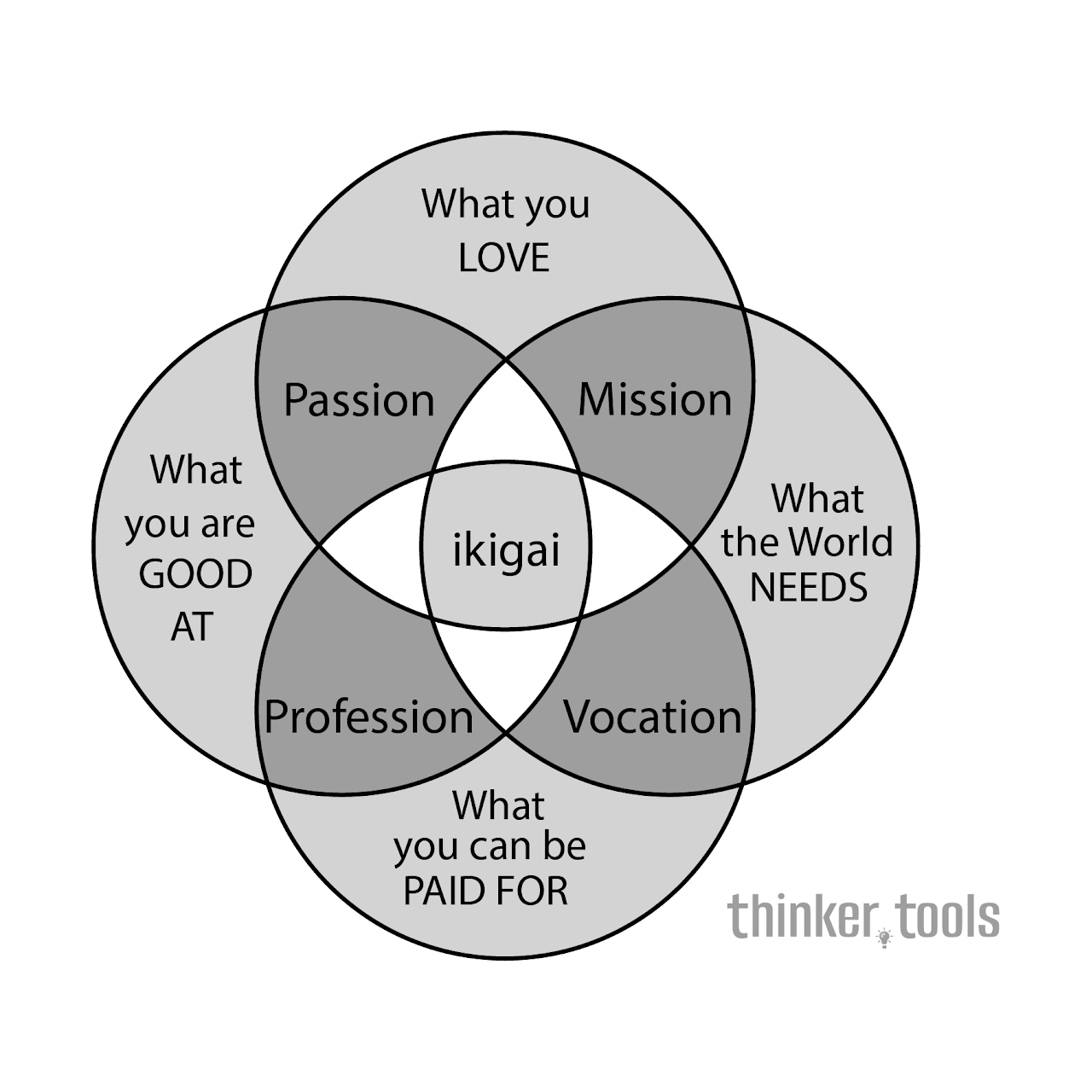
What is Ikigai?
Ikigai (pronounced "ee-key-guy") is a Japanese concept that translates roughly to "reason for being" or "reason to wake up in the morning." It represents the intersection of four fundamental elements:
- What you love (Passion)
- What you're good at (Profession)
- What the world needs (Mission)
- What you can be paid for (Vocation)
Your Ikigai lies at the center where all four circles overlap—the place where your passions, talents, values, and economic reality converge.
The History and Origin
While the concept of Ikigai has existed in Japanese culture for centuries, originating from the Okinawan islands (home to some of the world's longest-living people), the four-circle diagram commonly associated with Ikigai today was actually created by Spanish astrologer Andrés Zuzunaga in 2011. This Western interpretation merged the traditional Japanese philosophy with a more structured approach to finding purpose. The original Japanese concept is both simpler and more profound—it's about finding joy in life through purpose and community, regardless of career or monetary concerns.
How to Use Ikigai: Step by Step
Step 1: Self-Reflection on What You Love
List activities that make you lose track of time, topics you can discuss endlessly, and moments when you feel most alive. Don't censor yourself—include everything from professional interests to hobbies.
Questions to ask:
- What would I do if money were no object?
- What activities energize rather than drain me?
- What did I love doing as a child?
Step 2: Identify What You're Good At
Catalog your skills, both natural talents and developed abilities. Include feedback from others—we often undervalue our own strengths.
Questions to ask:
- What comes naturally to me that others find difficult?
- What do people ask for my help with?
- What skills have I developed over the years?
Step 3: Discover What the World Needs
Look beyond yourself to identify problems that need solving or values that need promoting. This could be local or global, specific or broad.
Questions to ask:
- What problems do I see that frustrate me?
- What change would I like to see in the world?
- How could my skills serve others?
Step 4: Determine What You Can Be Paid For
Research realistic income opportunities related to your interests and skills. Be creative—the gig economy has opened new possibilities.
Questions to ask:
- What are people currently paying for in my areas of interest?
- How could I monetize my unique combination of skills?
- What emerging opportunities align with my strengths?
Step 5: Find the Intersections
Map out where these four areas overlap:
- Passion (Love + Good at)
- Mission (Love + World needs)
- Profession (Good at + Paid for)
- Vocation (World needs + Paid for)
Step 6: Identify Your Ikigai
Look for themes and opportunities at the center where all four elements meet. Your Ikigai might not be one specific job—it could be a way of approaching whatever you do.
Step 7: Start Small and Iterate
Begin incorporating elements of your Ikigai into your current life. You don't need to quit your job immediately—start with side projects or volunteer work.
Practical Examples
Example 1: The Teacher-Turned-Educational-Entrepreneur
- Loves: Teaching and helping children learn
- Good at: Explaining complex concepts simply, creating engaging content
- World needs: Better educational resources for underserved communities
- Paid for: Online course creation and educational consulting
- Ikigai: Creating affordable, high-quality educational content for students worldwide
Example 2: The Corporate Executive Finding Balance
- Loves: Mentoring young professionals and strategic problem-solving
- Good at: Business analysis and leadership
- World needs: Ethical business practices and sustainable growth
- Paid for: Executive consulting and board positions
- Ikigai: Advising purpose-driven startups on sustainable growth strategies
Example 3: The Artist with Impact
- Loves: Creating visual art and environmental conservation
- Good at: Digital illustration and storytelling
- World needs: Climate change awareness and action
- Paid for: Commercial illustration and design work
- Ikigai: Creating compelling visual campaigns for environmental organizations
Benefits and Life Improvements
Deep Fulfillment
When you align your daily activities with your Ikigai, work stops feeling like work. You experience a profound sense of purpose that transcends monetary rewards.
Sustained Motivation
Operating from your Ikigai provides intrinsic motivation that doesn't depend on external validation or rewards. You're driven by internal purpose.
Reduced Stress and Burnout
When your work aligns with your values and strengths, you experience less friction and resistance. Energy that was once spent on forcing yourself through the day is redirected toward creation and growth.
Financial Sustainability
Unlike following pure passion without practical consideration, Ikigai ensures your purpose can sustain you economically, eliminating the stress of choosing between meaning and money.
Positive Impact
By definition, Ikigai includes serving the world's needs. Living your Ikigai means making a positive difference while fulfilling yourself.
Longevity and Health
Studies of Okinawans, where the concept originated, show that having Ikigai is associated with longer, healthier lives. Purpose provides a reason to stay active and engaged.
Authentic Living
Ikigai encourages you to be true to yourself while being practical about reality. This authenticity reduces the exhaustion of maintaining false personas.
Begin Your Ikigai Journey
Finding your Ikigai isn't a one-time event—it's an ongoing journey of discovery and refinement. As you grow and the world changes, your Ikigai may evolve too. The key is to start where you are, with what you have, and begin moving toward that central intersection.
Remember, Ikigai doesn't require dramatic life changes. Sometimes it's about bringing more of what you love into what you already do, or gradually shifting your career toward more meaningful work. The Japanese wisdom of Ikigai reminds us that a life well-lived balances personal joy with service to others, passion with pragmatism. Your reason for being is waiting to be discovered—not created from nothing, but uncovered from what already exists within you.